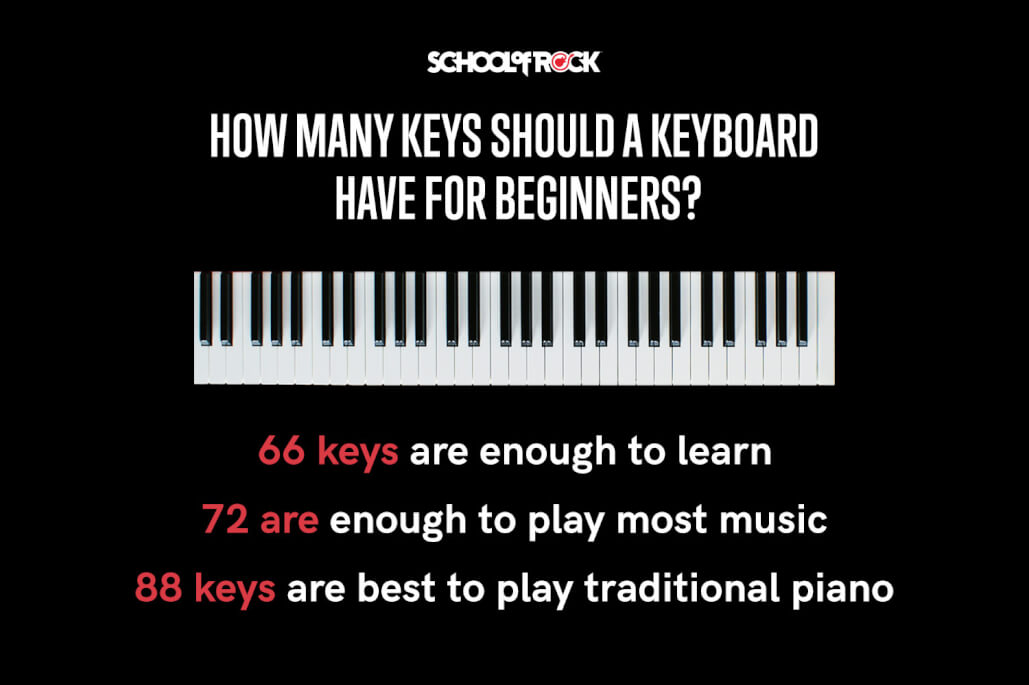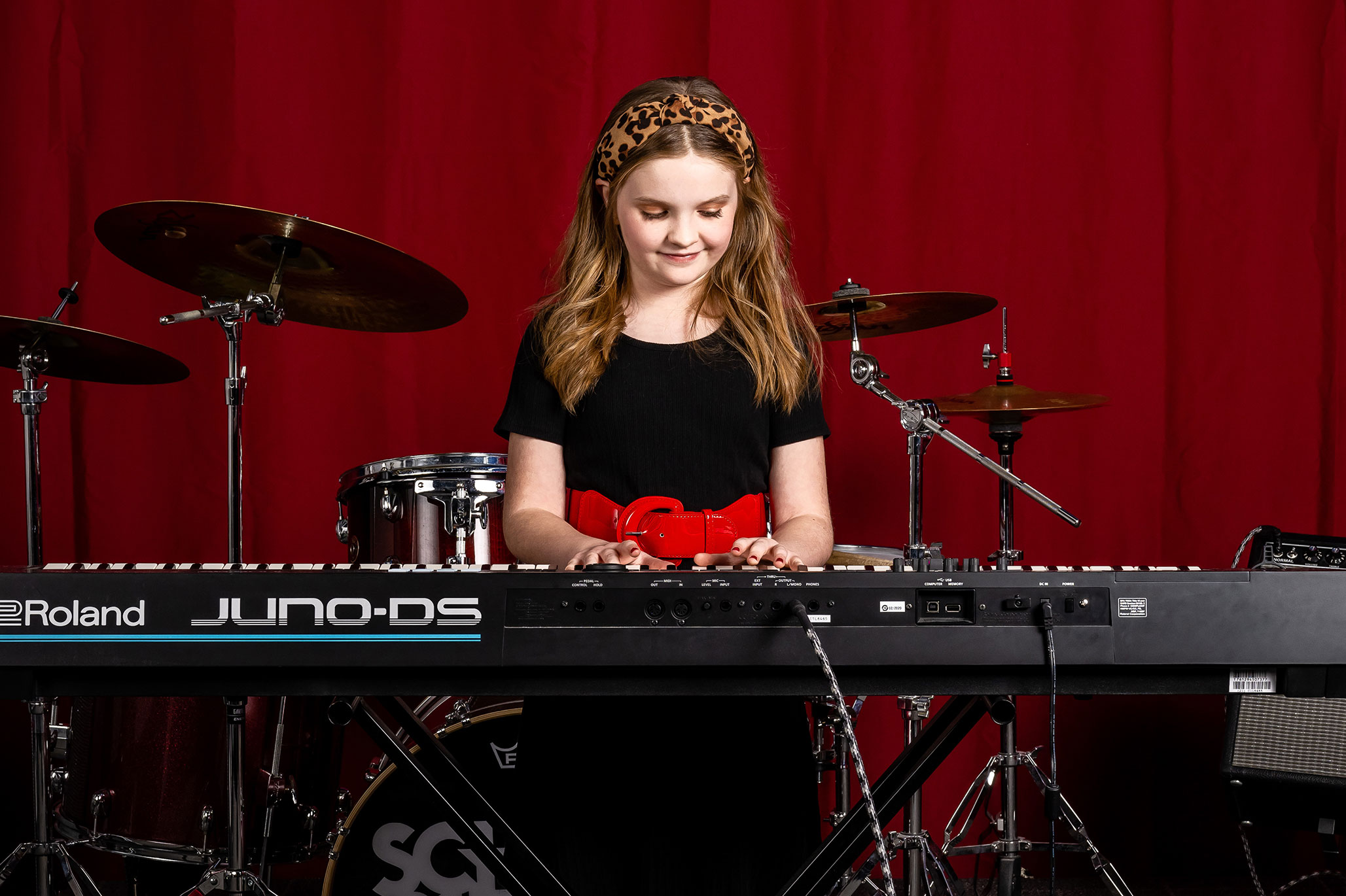A good beginner keyboard is an ideal instrument for students embarking on their musical education. Light enough to be transported, the best keyboard models teach students skills they transfer to full-size pianos.
In this keyboard buying guide, we’ll examine your options, whether you’re buying an instrument for a student or searching for the best keyboard for beginner adults (it’s never too late to learn to play).
How to Choose a Keyboard for Beginners
“What keyboard should I buy for beginners?” We hear this question all the time, and there’s no easy answer. The answer depends, in part, on what the student’s goals are.
A student who wants to compose her own tunes has slightly different needs than a student who plans to transition from a keyboard to a piano (if this describes your student, it’s important to understand the difference between a piano and a keyboard).
Having said that, a good beginner keyboard should have certain characteristics.
What to Look for when buying a Keyboard
- Action: Action describes how well the keys on a keyboard or piano respond when they’re pushed down. Each keyboard model’s action varies in firmness and resistance. Unweighted keys are easier to push down while weighted keys respond like a traditional piano, making a keyboard with weighted keys a good piano for beginners.
- MIDI Compatibility: MIDI stands for “musical instrument digital interface,” a common electronic instrument language that allows instruments to “talk” to each other by sending and receiving signals. While not a necessary feature in a music keyboard for beginners, MIDI compatibility may become more important to the student if he or she gets into electronic music or chooses to interface the keyboard with a computer.
- Computer Connectivity: Many of the best keyboard brands offer computer connectivity. Although it’s not necessary to learn to play, computer connectivity is a good option for students who plan to create their own music with music composition programs. Buying a beginner keyboard with computer connectivity now may help avoid the need to upgrade the keyboard in the future.
- Sampler/Recording Capabilities: As with MIDI compatibility and computer connectivity, sampler and recording options are advised for students who want to create their own musical compositions.
- Storage: While an option, onboard storage isn’t necessary; students can download software patches and new keyboard sounds on micro-USB cards instead. When a keyboard buying guide lists storage as a feature, it usually refers to user settings—a keyboard with 100 different sounds, for instance, may have an additional 100 blank settings for new sounds and user presets.
- Input/Output: Audio input to a keyboard or digital piano is uncommon and almost always uses MIDI when available. Keyboard output is a much more important feature, as it allows the use of amps and recording equipment.
- Sound: Keyboard sound is one of the most important considerations when choosing a good beginner keyboard. The best keyboard brands produce sounds equivalent to those produced by a true piano.
Other considerations include polyphony (the number of sounds a keyboard produces at any given time) and multitimbrality (the ability of the keyboard to play sounds such as drums, strings and woodwinds as a background or complement to the tune being played). - Keyboard Size: A keyboard with full-size and weighted piano keys is perhaps the best keyboard to learn piano for adults. Such keyboards tend to have fewer sound options, however. For students interested in electronic music, a good beginner keyboard has smaller and unweighted keys but more sound functions.
Buying keyboard accessories
In addition to the keyboard itself, you will need something to sit on as he or she plays and a stand to hold sheet music. For students working with a beginner keyboard, an electronic sustaining or dampening pedal is useful as it re-creates a piano’s ability to allow the instrument’s strings to vibrate freely. It’s often possible to purchase stands, seats and other accessories in bundles with beginner keyboards.
Best Keyboard Brands for Beginners
The keyboard brand you choose depends on multiple factors. Children’s interests and tastes can change quickly, and the student who’s thrilled to be learning the keyboard today might have a very different opinion on the subject in six months.
The cheapest keyboard brands (those found in big-box retailers) often have smaller keys than their higher-quality counterparts. Their sound quality isn’t as good as higher-end keyboards, and they’re usually made from cheaper parts that can break easily.
Fortunately for your wallet, some of the best keyboard brands are quite affordable. Yamaha, Roland, and Kurzweil all offer inexpensive boards with different key ranges, built-in speakers, and a wide variety of sound options.
For the more advanced or motivated student, consider Korg or Williams boards. The full-size weighted keys of a Williams keyboard make a good choice for adults and any student planning on learning traditional piano in the future.
Types of Keyboards
Keyboards for beginning piano students differ from keyboards for students planning on rocking out or composing electronic music. While the best keyboard for beginner adults may be a smaller keyboard for beginners, children as young as 10 may be more motivated if their keyboards help them play (and create) popular music.
There are literally thousands of different types of keyboards. So what are the best ones for beginners? Our keyboard buying guide has the answers—so let’s take a look!
What Is a Workstation Keyboard?
A workstation keyboard is one of the more expensive keyboards and essentially includes its own computer for composition and advanced program options. These are the keyboards used by many hip-hop and pop artists to program beats and other parts of the composition to play automatically.
Workstation keyboards often include weighted keys, making them a good choice for the advanced beginner keyboard student. For the fledgling composer, however, a controller and laptop provide the same tools for a lower price.
Advantages of a Workstation Keyboard
- Great for composition
- Allows preprogramming of simultaneously played music features
- Has weighted keys
- Offers professional industry standards and advanced play options
Disadvantages of a Workstation Keyboard
- They tend to be priced at the higher end of the scale
- The sheer number of features can intimidate and overwhelm new students
What Is an Arranger Keyboard?
Arranger keyboards are designed to provide auto-accompaniment. Simply select a few options, and the keyboard then lays down a backing track that matches the style, rhythm, and tempo of the piece being played. This helps students get a feel for playing with other musicians while allowing them to play solo compositions.
Advantages of an Arranger Keyboard
- Conforms to professional industry standards
- Is well suited for composition
- Has auto-accompaniment that encourages students to play
Disadvantages of an Arranger Keyboard
- Starting prices can be higher than those of less advanced keyboards
- Beginners can find the range of programmable options overwhelming
What Is a Synthesizer?
A popular music keyboard for beginners, a synthesizer is an electronic keyboard capable of generating a wide range of sounds, from musical instruments to sound effects. They’re smaller and more portable than keyboards for beginning piano students and ideal for the keyboard student interested in playing in bands or small ensembles.
Advantages of a Synthesizer
- Is designed for playing with other musicians
- Provides output to amps or recording equipment
- Bridges the gap between a piano and digital equipment
- Offers multiple sound options
Disadvantages of a Synthesizer
- There is a wide range of quality between brands
- Students may outgrow keyboard capabilities
- Unweighted keys can make the transition to the full piano more difficult
What Is a Digital Piano?
A digital piano, as the name suggests, is a keyboard designed to imitate the sounds and feel of a piano. This is probably the best keyboard for students who need to focus on practicing and musicianship and can be the best keyboard to learn piano for adults.
Unlike many other keyboards, a digital piano usually has 88 full-size keys. The best keyboards will have weighted and graded keys to mimic the feel of a real piano and often will have speakers built right into the keyboard.
Digital pianos don’t often have the sound range of synthesizers—they’re intended for serious practice rather than musical experimentation.
Advantages of a Digital Piano
- Feels like playing a traditional piano due to the weighted and graded keys
- Produces a great piano sound
- Offers volume control
- Is cheaper than a traditional piano—there’s no need to tune or replace broken parts
- Is ideal for practice and solo performances
Disadvantages of a Digital Piano
- These pianos have relatively few sound options
- They’re not portable like synthesizers
- The absence of full-size eight-inch jacks can make setup for playing gigs troublesome
What Is a Controller Keyboard?
Controllers have lower price tags than other keyboards for beginning piano students because they lack any built-in sound-generating capabilities. Instead, the keyboard transmits MIDI data to other hardware or software. While a good choice for someone interested in creating computer-based music, controllers are not recommended for students who want to play, rather than program, their music.
Advantages of a Controller Keyboard
- Can be used for computer composition
- Outputs MIDI information to synthesizers and computer software
Disadvantages of a Controller Keyboard
- Must be plugged into a computer or laptop
- No onboard sounds
- A poor choice for beginner keyboardists
These types of keyboards are hardly the only options available. Many modern keyboards offer features that blur the line between different keyboard types. For instance, you may find a digital piano with synthesizer capabilities or a synthesizer with aspects of a controller keyboard.
This complexity makes it difficult to compare individual keyboards. The sounds produced by the best keyboard brands will vary from model to model, even on keyboards whose specifications look almost identical. Before making a final decision, consider your child’s musical interests and goals, read reviews, and talk to local musicians and instrument store staff.
Do You Need an Amplifier for Your Keyboard?
The short answer to this question is no—at least not right away. Most beginner keyboards come with built-in speakers. Once you or your child starts performing publicly, however, an amp may become necessary.
Pro Tip: use headphones for quiet practice
No one becomes a musical virtuoso overnight—practice is essential. Every missed key and out-of-tempo tune is a necessary part of practice, but let’s face it: mistakes can be difficult to listen to. Fortunately, most keyboards come with a headphone jack, so students can make the mistakes needed for improvement without also playing on the frayed nerves of family and neighbors!
Key Considerations
The number of keys on a keyboard affects what can be played. Most keyboards come with 66, 72, or 88 keys. For a beginner, 66 keys are sufficient for learning to play, and you can play most music on a 72-key instrument. For anyone interested in playing classical piano, however, a full 88 keys are recommended, especially if you plan on one day playing a traditional piano.
Many keyboards have fewer than 66 keys. This is common for a synthesizer or keyboard dedicated to producing electronic organ music. For instance, an analog synthesizer restricts itself to the number of keys needed to play songs in particular genres. Professional keyboards can often shift keys up or down to accommodate specific ranges.

How Many Keys Should a Keyboard Have for Beginners?
While 88-key digital pianos are the best choice for students planning on learning to play traditional piano, students can learn to play with a simpler 66-key instrument. And ease of use isn’t the only consideration: a 66-key instrument is usually cheaper.
If you’re not sure your child will stick with practice, you may want to opt for the lower price tag and upgrade to 88 keys later. The best keyboard for adults, however, usually has 88 keys.
Play piano this summer
Offered throughout the summer season, School of Rock piano camps teach students how to play their favorite songs as part of a band. With workshops ranging from songwriting to performing onstage, our summer piano camps are perfect for students of all skill levels.
Check out Summer Camps
Buying a New versus Used Keyboard
If you’re on a budget, buying a used keyboard may make more sense than investing in a new instrument. Before you make the decision between new or used, here are some details to consider.
Buying New Keyboards for Beginners
Buying a new keyboard gives you the opportunity to discuss with store staff what type of keyboard is best for your needs. At School of Rock, we offer all the information and accessories you need to make your purchase.
Advantages of a New Keyboard
- More likely to include the features you need
- Usually comes with a good warranty
Disadvantages of a New Keyboard
- They can sometimes be more expensive, although many non-name-brand keyboards are affordably priced
Buying Used Keyboards for Beginners
A used keyboard can give you a high-end instrument for less money, but as with all used purchases, let the buyer beware. Some used instruments are in good condition; others have been cared for poorly. If you know an experienced musician, ask him or her to weigh in on whether a used keyboard is worth your investment. Check your potential purchase carefully, turning it on and making sure all keys and buttons work.
Advantages of a Used Keyboard
- Often less expensive than newly purchased instruments
- Possibility of picking up a high-end keyboard cheaply
Disadvantages of a Used Keyboard
- They may be faulty or damaged
- You won’t have a warranty on your keyboard
- The available options may not fit your needs well

Whether you’re picking up a keyboard for your child or want to learn to play yourself, your keyboard isn’t worth it if it sits unused in a corner of the room. School of Rock focuses on teaching students to enjoy playing their instruments first.
Once students start enjoying to play, they’re eager to discover the broader concepts of music so they can start performing. When students know they’re preparing for their first rock concert, practicing pretty much takes care of itself.
We love providing students with everything they need to start playing immediately, from the keyboard to accessories, lessons, day camps and even that first concert. Our kids and adults grow from total beginners to performers who go onstage—and on tour. Along the way, they build confidence and make lasting memories and friendships with others pursuing their lifelong passion for music.






